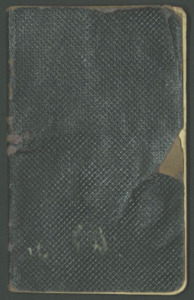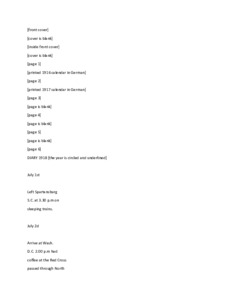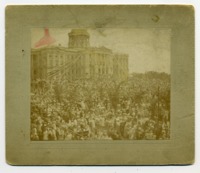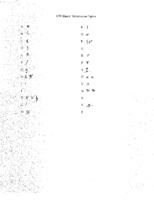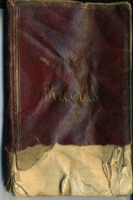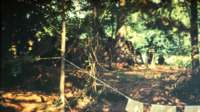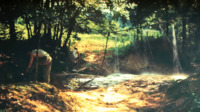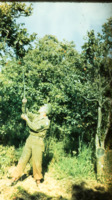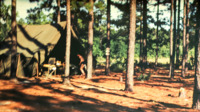
Browse Items (32 total)
Sort by:
-
World War I diary of Archie Duncan Shannon.
Archie Shannon was a farmer who served in Company G of the 1st Pioneer Infantry in World War I. Shannon was born in Limestone County, Alabama on November 19, 1891, and at the time of his draft registration on June 5, 1917, he lived in Ardmore, Tennessee. Shannon reported for military duty on September 18, 1917 and entered training at Camp Pike, Arkansas.
This diary covers Shannon's experiences in the U.S. Army from July 1, 1918 to July 7, 1919. He describes his journey to France and details everyday life as a soldier, especially the discomforts of life on the front in both the Marne and Verdun sectors. Shannon discusses bathing and sleeping arrangements, gas masks, air raids, and the terrible sights of war-torn France while repairing roads and burying dead soldiers. Shannon includes descriptions of his involvement in the Meuse-Argonne Offensive, noting the continuous shelling, gas attacks, and miserable weather conditions. He also describes his company's reaction to the Armistice, writing, "Many happy hearts in our company everyone seems to take life anew."
Shannon spent the rest of his World War I service in Belgium, Luxembourg, and Germany, and he returned to the United States on July 7, 1919. A list of soldier names and hometowns is recorded in the back of the diary. Shannon died on May 20, 1969 and is buried in Gatlin Cemetery in Ardmore, Alabama. -
Transcript of the World War I diary of Archie Duncan Shannon.
Archie Shannon was a farmer who served in Company G of the 1st Pioneer Infantry in World War I. Shannon was born in Limestone County, Alabama on November 19, 1891, and at the time of his draft registration on June 5, 1917, he lived in Ardmore, Tennessee. Shannon reported for military duty on September 18, 1917 and entered training at Camp Pike, Arkansas.
This diary covers Shannon's experiences in the U.S. Army from July 1, 1918 to July 7, 1919. He describes his journey to France and details everyday life as a soldier, especially the discomforts of life on the front in both the Marne and Verdun sectors. Shannon discusses bathing and sleeping arrangements, gas masks, air raids, and the terrible sights of war-torn France while repairing roads and burying dead soldiers. Shannon includes descriptions of his involvement in the Meuse-Argonne Offensive, noting the continuous shelling, gas attacks, and miserable weather conditions. He also describes his company's reaction to the Armistice, writing, "Many happy hearts in our company everyone seems to take life anew."
Shannon spent the rest of his World War I service in Belgium, Luxembourg, and Germany, and he returned to the United States on July 7, 1919. A list of soldier names and hometowns is recorded in the back of the diary. Shannon died on May 20, 1969 and is buried in Gatlin Cemetery in Ardmore, Alabama. -
Crowd gathered at the capitol building in Denver, Colorado.
A handwritten inscription on the back of the photo notes, "The day 'our soldiers' came home, in front of capital. Sept. '99." -
Transcript of the Civil War diary of George Washington Harris.
Harris served as a private in Company F of the 149th Indiana Infantry Regiment, which occupied Decatur, Alabama in 1865. He enrolled at Terre Haute, Indiana, on February 15, 1865 at the age of twenty. Harris records his experiences as a soldier and traces his journey south to Decatur. Harris was discharged on September 27, 1865. The transcription includes a key to the cipher that Harris sometimes used, as well as notes and clarifications in brackets and parentheses. Also included are the complete lyrics to the Union song "Reply to the Bonnie Blue Flag," part of which Harris records in an entry here. -
Civil War diary of George Washington Harris.
Harris served as a private in Company F of the 149th Indiana Infantry Regiment, which occupied Decatur, Alabama in 1865. He enrolled at Terre Haute, Indiana, on February 15, 1865 at the age of twenty. Harris records his experiences as a soldier and traces his journey south to Decatur. Harris also describes his interactions with locals in North Alabama, writing in April 1865 that he "halted to talk with a family of Rebbs questioning concerning their so-called independence but found out nothing of importance Except that ther hopes had fled." He also includes descriptions of skirmishes in which he took part, as well as lengthy descriptions of the terrain and weather. Harris adds his comments on the assassination of Abraham Lincoln and writes down song lyrics and poetry at points. Harris was discharged on September 27, 1865. -
Soldiers bathing outdoors at a National Guard camp.
This photograph was likely taken during Alabama Army National Guard field training exercises at Fort McClellan, near Anniston, Alabama. -
Bivouac site at a National Guard camp.
This photograph was likely taken during Alabama Army National Guard field training exercises at Fort McClellan, near Anniston, Alabama. -
Outdoor shower at a National Guard camp.
This photograph was likely taken during Alabama Army National Guard field training exercises at Fort McClellan, near Anniston, Alabama. -
Unidentified master sergeant under orange trees at a National Guard camp.
This photograph was likely taken during Army National Guard field training exercises. -
Bivouac site at a National Guard camp.
This photograph was likely taken during Alabama Army National Guard field training exercises at Fort McClellan, near Anniston, Alabama.
